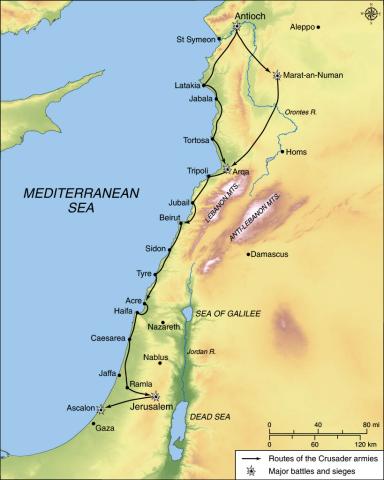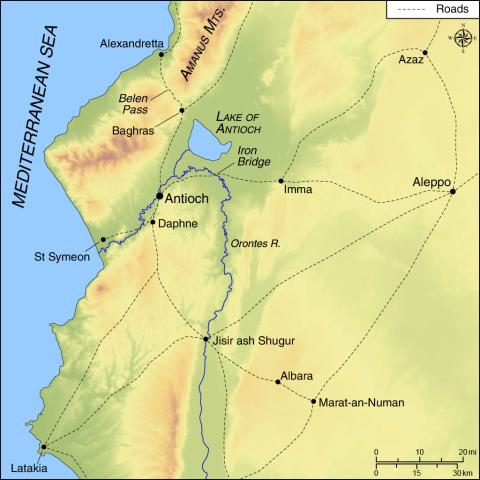The March to Jerusalem
[10.34.3] Exiērunt autem nostrī et vēnērunt hospitārī iuxtā Caesarēam, super fluvium Farfar. Cumque vīdisset rēx Caesarēae contubernium Francōrum tam prope cīvitātem hospitātum esse, doluit animō, et iussit illīs dēvetārī mercātum, nisi discēderent ā cīvitātis cōnfīniō. Crāstinā vērō diē mīsit cum illīs duōs Turcōs—suōs vidēlicet nūntiōs—quī eīs mōnstrārent flūminis vadum, eōsque condūcerent ubi invenīre possent ad capiendum. Dēnique vēnērunt in vallem quandam subter quoddam castrum, ibique dēpraedātī sunt plūs quam quīnque animālium mīlia, et satis frūmentī atque alia bona, unde valdē fuit refecta tōta Chrīstī mīlitia. Tamen illud castrum reddidit sē comitī, eīque dedit equōs et aurum pūrissimum; et iūrāvērunt suā lēge quod peregrīnīs nīl exinde fieret malī. Fuimusque ibi per quīnque diēs. Ēgressī etenim inde, pervēnimus gaudentēs hospitārī ad quoddam Arabum castrum. Exīvit igitur dominus castrī, et concordātus est cum comite.
notes
(January–February 1099) When the crusaders camp near his city, the leader of Caesarea becomes afraid and will provide a market only if they move away. He sends guides to lead them to a valley that they might plunder, and a castle surrenders. The crusaders move on to another castle, held by friendly Arabs.
iuxtā Caesarēam, super fluvium Farfar: beside Shaizar (ancient Larissa) on the Orontes. The crusaders called the city Caesarea.
contubernium Francōrum: “the encampment of the Franks.”
ubi invenīre possent ad capiendum: “where they could find things for plundering.”
in vallem quandam subter quoddam castrum: the fort is unidentified.
Tamen illud castrum reddidit sē comitī: we might have expected et or itaque.
et iūrāvērunt: the subject is “(the people in) the castrum.”
suā lēge: according to Islamic law.
nīl ... malī: “no harm,” partitive gen.
ad quoddam Arabum castrum: probably the modern Masyaf.
vocabulary
contubernium –iī, n.: tent; (ML) encampment
prope: near (prep. + acc.).
dēvetō –vetāre –vetuī –vetitum: to forbid, ban (ML)
cōnfīnium –iī (–ī), n.: a confine, limit, boundary.
vidēlicet: namely, that is to say
vadum –ī, n.: shallows, ford
dēpraedor (1): to pillage, plunder


